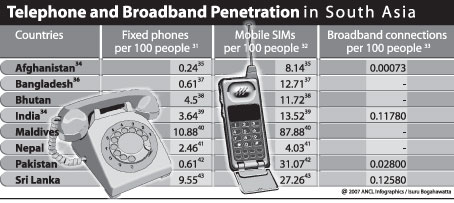Strengthening economy with broadband Internet
Sanath Siriwardena
The Broadband is the high speed Internet that allows users to access
the Internet at faster speeds, completes tasks quickly than ordinary
Internet, and always-on technology that packed with many other
interactive services. This is the simplest definition available for
broadband Internet.
 The medium could be anything from fiber, cable, wireless and if its
fast and broad enough to pump more data, then it's called broadband. The medium could be anything from fiber, cable, wireless and if its
fast and broad enough to pump more data, then it's called broadband.
The broadband Internet or "high speed" Internet hit Sri Lankan
community in early 2003 with the introduction of ADSL (Asymmetric
Digital Subscriber Line) Internet by the incumbent operator, Sri Lanka
Telecom Limited.
The "broadband" remained as something unfamiliar to many Sri Lankans
for the last couple of years. However, the situation has changed as more
players started to provide broadband services in recent times.
Dialog Telekom has also entered into the broadband market in the
country last year with state-of-art wireless broadband Internet service
called WiMax. (World Wide Interpretability for Microwave Access).
Dialog will be the second to provide broadband and will be the first
to provide WBA (wireless broadband access) environment in Sri Lanka.
However, the number of players in the market alone would do no good
to the country unless we indentify the significance of broadband
Internet.
 The word broadband is in fact broad and it packed with multiple
futuristic services. The capabilities of broadband are unmatched.
Broadband could be regarded as a modern life-companion, which promises
wide range of social, and economic benefits to its users by changing the
way they work, think, live and entertain. The word broadband is in fact broad and it packed with multiple
futuristic services. The capabilities of broadband are unmatched.
Broadband could be regarded as a modern life-companion, which promises
wide range of social, and economic benefits to its users by changing the
way they work, think, live and entertain.
Countries around the world such as South Korea, Japan, Canada, Sweden
and especially the European countries timely identified the importance
of broadband and already adapted the service to their economies with no
time.
Many governments in Europe are taking the lead and they were
expecting a 30% increment in total productivity growth upon successful
completion of broadband by the end of 2010. This shows that the place
once occupied by the ordinary telephone has taken by the ascendant
broadband.
Their is no doubt that the socio and economic revolution created with
the introduction of telephone in 20th century would recreated by the
broadband all over the world in 21st century.
In developed countries, broadband is a public commodity like water
and electricity that is needed in day-to-day life. People living in
countries with higher broadband and Internet penetration, have the
privilege of doing their regular things over the Internet.
Companies providing public utility services like electricity,
telephone, water and even banks have come on-line to serve their
customers by further assuring the quality of services that they provide.
Having identifying its role, governments are taking every possible
step to encourage the development of broadband within their
jurisdiction.
In fact, the broadband "boom" was first witnessed in South Korea. The
broadband initiatives were implemented by the government of South Korea
have contributed vast amount of benefits to its economy that no one
could ever believe.
The figures have shown in 2002, more than 30% of their GDP transacted
over the Internet, indicating the world how broadband could change any
economy in the world if adopted. It is inevitable, that government's
direct involvement and its polices were playing a major role in creating
a mass scale broadband market in any territory. What is underneath in
every successful broadband story is the government's involvement.
The success of Nenasela project in Sri Lanka is another good example
for this. In less than two years, 500 Nenasala centers have opened
mainly in rural areas by the ICTA, under the guidance of President
Mahinda Rajapaksa.
The creation of "knowledgeable society" considered as one of the main
concepts of broadband. The vast amount of Information, entertainment and
services makes life easier than ever before. The overall efficiency will
have great impact on national GDP and this growth of economy will be a
benefit for the people living in the country.
Many organisations around the world, implemented policies for
broadband, further assuring the work role of it, in favour of its
benefiters. The on-line services available such as social and public
welfare, governments find it easier to deliver their services to the
public than ever before. The e-governance will increase the efficiency
of the governments, and this reduces the gap between people and the
government.
Therefore, the government can primarily encourage the use of
broadband Internet through e-government process.
This country is about to miss this golden opportunity as we have
missed many others. If we delay the adoption, this would be a great
injustice to the country, people and to the economy.
Governmental investment on broadband infrastructure will lead to
greater economic wealth and social fulfillment for the country - and if
not acted upon soon, some of the opportunities, especially industry
competitiveness, will be lost, as other countries will already seize the
advantage.
National policy for broadband is required without further delaying to
accomplish these tasks and more importantly, the government's
intervention is essential. To accelerate the broadband growth in the
country, the government has to take the lead through examples.
Telecommunication Infrastructure development is very vital for the
smooth role out of broadband in the country. Undoubtedly, the market
conditions and the infrastructure access problems prevented the country
from achieving its Internet oriented goals.
The benefits expected from the International trade lost due to under
developed-uncompetitive, costly infrastructure facilities in the
country. BPO companies would be reluctant to invest because of highly
priced communication infrastructure and deprived quality services.
Especially the leased line prices are discouraging the foreign
investors from opening their offices in Sri Lanka. Indo-Sri Lanka price
comparison indicates that Sri Lankan prices are more than 590% higher
than in India.
Because of this, the nation will continue to live in the dark and
compensate for the benefit of providers. These type malaises in Sri
Lankan telecom sector will jeopardise the economy of this country and
directly causing heavy burden to the government.
To counteract this situation, national priority should be given to
the process of implication of broadband policy and the government's
appropriate actions regarding this would be needed.
Creating an independent body or task force, backed by the government,
to study the present Internet environment in the country is essential.
To achieve its goals, the broadband task force should come under the
head of the state.
To meet the emerging demands of competitive world, national policy
for broadband Internet is a must. Government offices, banks, schools,
universities, hospitals, hotels and private sector companies must turn
to broadband oriented places where others have the access remotely.
People in the country must be educated regarding broadband technology
and the benefits people could reap by using. Broadband should not be a
luxury in Sri Lankan's life any more.
Similarly, all citizens in this country must have the privilege of
accessing the Internet at affordable price with fast enough connection
to accomplish one's tasks. To make this happen, broadband should
recognise as a 'national goal' and the priority should be given.
The creation of e-Sri Lanka and making of knowledgeable society
through increasing the IT literacy as stated in "Mahida Chinthnaya" is
possible by creating a nationwide access network, where all people can
have access to the Internet, affordably irrespective of their social
levels. The less beneficiaries from rural villages, must collectively
added to the mainstream of the economic development of the country by
facilitating broadband Internet in to their village hoods.
The President's vision for e-Sri Lanka was clearly stated in his
manifest and there would be no such document in the history like Mahinda
Chinthnaya, which recognises the importance and the necessity of IT
development in this country.
The President's commitment for making e-Sri Lanka by increasing the
computer literacy in the country again highlighted in his speech, at the
inauguration of 500th Nenasala centre recently.
The President's commitment, vision and readiness will further
encourage and strengthen the hearts of people through his leadership.
Therefore, I would like to invite experts, service providers and policy
makers to join to strengthen the country through making a Sri Lanka an
IT HUB in the South Asian region.
The Broadband in Sri Lanka in 2010 is the "dictum" we should use in
the future to inspire the minds of our people. |

